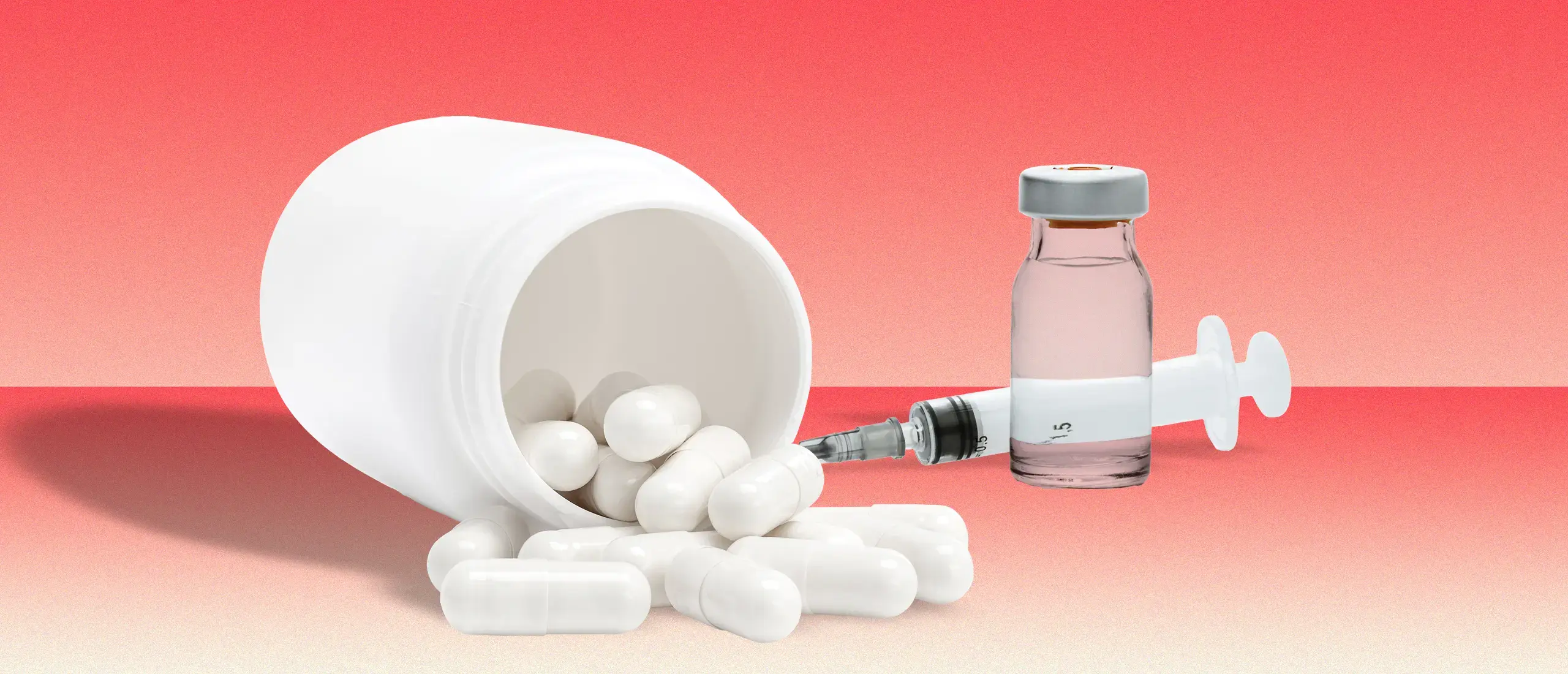What to Avoid When Taking Glutathione, According to Experts
- By Jennifer Chesak
- January 31, 2024
If you’re someone who aims to be on top of the latest health trends, you’ve likely heard of glutathione, a master antioxidant—but should you add it to your stack?
“Glutathione, the body’s ‘master antioxidant,’ is a powerful compound that’s present in every cell of our body and is composed of three basic building blocks—glycine, cysteine, and glutamic acid,” Kelsey Costa, M.S., R.D.N. says. In short, the antioxidant may help to protect your body from chronic disease (1).
But is it safe for everyone? We tapped three health professionals to help explain what the supplement is, what it does, and what to avoid when taking glutathione.
What Is Glutathione?
Glutathione, also known as GSH, is the most abundant antioxidant your body naturally produces (1). But as with many substances your body creates, glutathione levels decrease with age, which contributes to age-related decline. Age-related decline and reduced GSH levels are linked to many conditions, ranging from dementia to type 2 diabetes (2).
But what exactly does GSH do? “It plays a critical role in various physiological processes, including redox balance, oxidative stress reduction, metabolic detoxification, and immune function regulation,” Menka Gupta, M.D. says. “It’s a source of sulfate and plays a key role in detoxification.”
Although this antioxidant is naturally present in the body, eating nutrient-dense foods can also boost glutathione levels (3). You can also take oral glutathione supplements over the counter, though research is limited on how well the body can absorb it. However, a 2015 study shows that people’s GSH levels increased after just one month of taking it in pill form (1).
You can also receive a prescription for self-injection of a glutathione supplement. Others may prefer getting their hit of GSH through topical sprays—more on that soon (4).
About the Experts
Kelsey Costa, M.S., R.D.N., is an integrative registered dietitian and nutrition consultant for the National Coalition on Healthcare. She’s passionate about making nutrition and health science accessible to all and advocates for evidence-based health initiatives
Menka Gupta, M.D., is a physician and functional medicine certified practitioner (IFMCP) in Singapore. She’s a functional medicine doctor at Nutranourish, where she examines hormonal imbalances, food sensitivities, gut microbiome and genetic predisposition, and micronutrient deficiencies to help pinpoint the underlying cause of disease.
Bethany Tennant, N.D., C.N.S., is a naturopathic doctor and certified nutrition specialist in Portland, Oregon. She specializes in natural sports medicine, which entails fueling for sports performance and recovery. She also works on identifying nutrient deficiencies and food sensitivities.
What Should I Know Before Taking Glutathione?
Consuming foods that naturally boost glutathione levels is generally safe, Costa explains. But when it comes to supplementing it into your diet, you’ll want to consider taking an extra step before starting. “It’s crucial to consult with a healthcare provider before starting any supplement regimen, including glutathione,” Costa says.
Bethany Tennant, N.D., C.N.S., notes that taking GSH may lower your zinc levels, in addition to causing some other side effects (3, 5). Bloating, abdominal cramping, skin rashes, and exacerbated asthma symptoms (if glutathione is inhaled) are all some adverse effects you could experience.
More serious, albeit rare, side effects of supplementing with too much GSH include Stevens-Johnson syndrome and toxic epidermal necrolysis—both of which are severe skin conditions that are considered a medical emergency (6).
Are There Any Foods or Drinks to Avoid When Taking Glutathione?
Certain foods and beverages can deplete glutathione levels. So when supplementing, you may want to consider ditching ultra-processed meals and snacks (think: fried and sugary foods), as well as alcohol, since these tax the liver, Tennant says.
“Generally, I advise patients to minimize oxidative stress while taking glutathione to maximize its benefits,” Gupta explains. Free radicals are key components of oxidative stress, and you can be exposed to them in a variety of different ways.
Eating a diet that’s high in fat, being exposed to cigarette smoke (firsthand or secondhand), drinking too much alcohol regularly, using NSAIDs like acetaminophen frequently, and having chronic inflammation are all ways free radicals enter your body, adds Gupta (7).
How to Naturally Boost Glutathione Levels With Food
Tennant says some foods can help boost GSH production, including (3):
- Whey protein
- Lean meat
- Eggs
- Fish
- Grains
- Avocados
- Onion
- Garlic
- Broccoli
- Kale
- Cabbage
Costa advises reaching for foods that are rich in the antioxidant powerhouse, vitamin C. These include bell peppers, strawberries, and citrus fruits, as they all “contribute to maintaining glutathione levels by warding off oxidative stress,” she explains (8).
She also says selenium, found abundantly in Brazil nuts, helps with GSH production (9). However, if you consume too much selenium, you can develop uncomfortable gastrointestinal side effects (10). Keep consumption of Brazil nuts to about a handful daily and mix in other nuts to create a satiating snack.
Healthy lifestyle habits might also support glutathione levels. Costa recommends maintaining good sleep patterns, exercising regularly, and keeping alcohol consumption low (11, 12).
The Bottom Line
Glutathione, the body’s master antioxidant, declines as we age. You can support your levels naturally through a balanced diet and maintaining healthy lifestyle habits or you might opt for supplementation. While taking glutathione supplements is generally considered safe, experts note a few possible side effects—from reduced zinc levels to skin rashes—and recommend consulting your healthcare provider.
Frequently Asked Questions
Does glutathione interact with any medications?
Information on whether glutathione interacts with medications is limited. “It’s generally considered safe,” Tennant says. Your best bet is to talk to a doctor who knows your medical history and medications, that way they can advise whether or not there are any personal risks to be mindful of.
How is glutathione administered?
There are three main ways to take glutathione: oral supplements, self-injections, and topical sprays. The research around whether or not glutathione supplements taken orally can boost your levels of the antioxidant is a bit of a mixed bag (1, 13). Injections may be the most effective route, in terms of protecting yourself from oxidative damage, however, more research is needed (14). Topical sprays are most often used for cosmetic purposes, such as lightening skin discolorations on the body, known as melasma (15).
References
1. Richie JP, et al. (2015). Randomized controlled trial of oral glutathione supplementation on body stores of glutathione.
2. Thomas NO, et al. (2016) Glutathione maintenance mitigates age-related susceptibility to redox cycling agents.
3. Minnich DM, et al. (2019). A review of dietary (phyto)nutrients for glutathione support.
4. Sasaninia K, et al. (2023). Topical absorption of glutathione–cyclodextrin nanoparticle complex in healthy human subjects improves immune response against mycobacterium avium infection.
5. Steiger MG, et al. (2017). Impact of glutathione metabolism on zinc homeostasis in Saccharomyces cerevisiae.
6. Sonthalia S, et al. (2018). Glutathione for skin lightening: a regnant myth or evidence-based verity?
7. Gabriele Pizzino, et al. (2017). Oxidative Stress: Harms and Benefits for Human Health.
8. Manita Yimcharoen, et al. (2019). Effects of ascorbic acid supplementation on oxidative stress markers in healthy women following a single bout of exercise.
9. Emma N. Bermingham, et al. (2014). Selenium-Enriched Foods Are More Effective at Increasing Glutathione Peroxidase (GPx) Activity Compared with Selenomethionine: A Meta-Analysis.
10. Lv Q, et al. Advances in research on the toxicological effects of selenium.
11. Malav S. Trivedi, et al. (2017). Short-term sleep deprivation leads to decreased systemic redox metabolites and altered epigenetic status.
12. Ahmed S Elokda, et al. (2007). Effects of exercise training on the glutathione antioxidant system.
13. Jason Allen, et al. (2011). Effects of Oral Glutathione Supplementation on Systemic Oxidative Stress Biomarkers in Human Volunteers.
14. Da Hye Kwon, et al. (2019). Protective Effect of Glutathione against Oxidative Stress-induced Cytotoxicity in RAW 264.7 Macrophages through Activating the Nuclear Factor Erythroid 2-Related Factor-2/Heme Oxygenase-1 Pathway.
15. P.E. Grimes, et al. (2019). New oral and topical approaches for the treatment of melasma.












